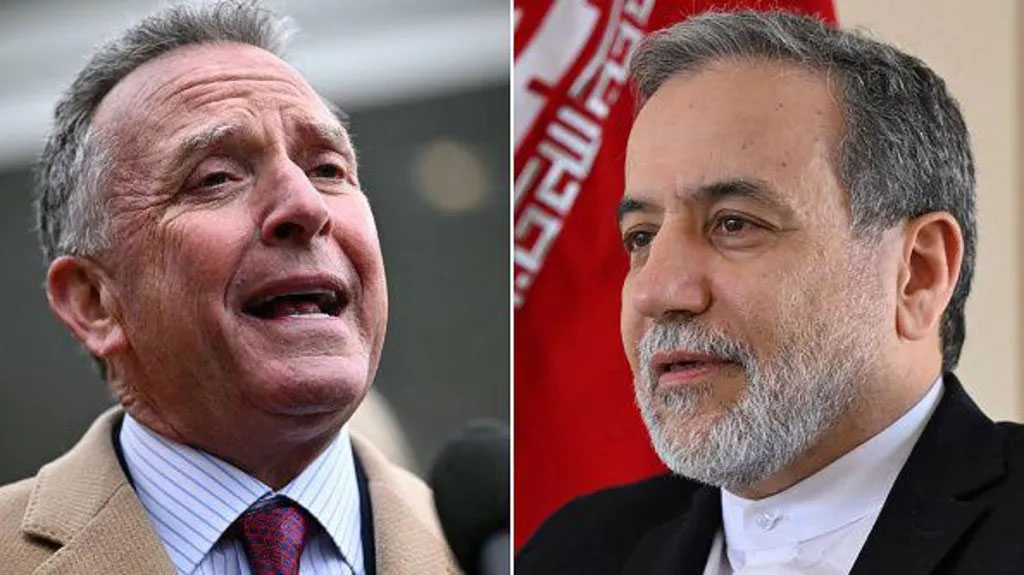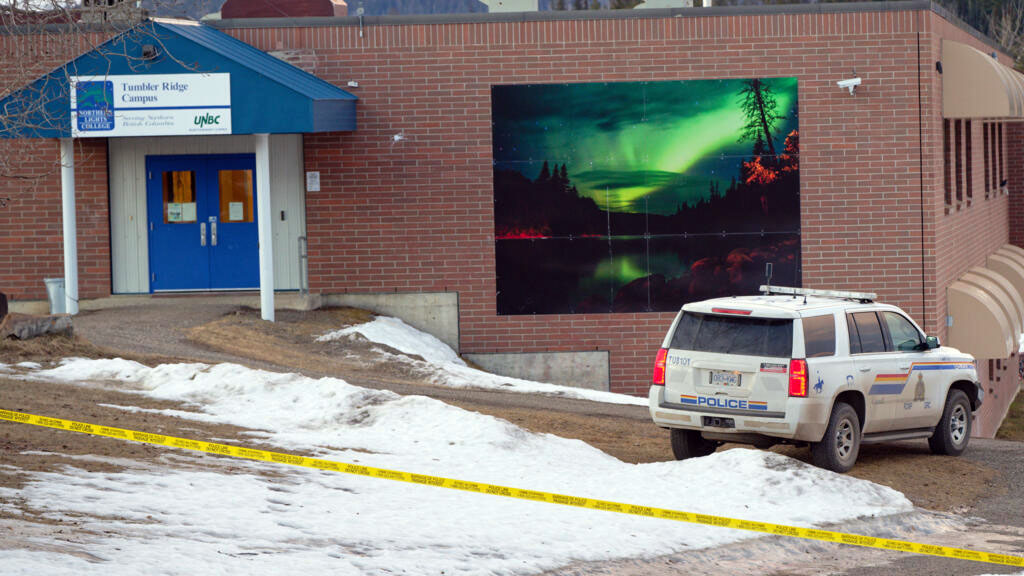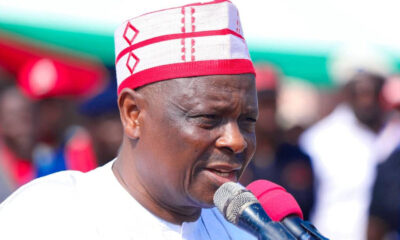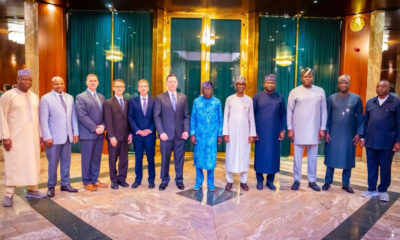International
US, Iran hold ‘constructive’ first round of nuclear talks

US, Iran hold ‘constructive’ first round of nuclear talks
Iran and the US have concluded a first round of talks in Oman over Tehran’s nuclear programme – the highest-level meeting between the two nations since 2018.
Both countries described the meeting as “constructive” and confirmed a second round of discussions will take place next week – with the US hailing the “direct communication” as being key to striking a possible deal.
President Donald Trump pulled the US out of a previous nuclear agreement between Iran and world powers in 2018, and has long said he would make a “better” deal.
The talks are seen as an important first step in establishing whether a deal can be done.
At two-and-a-half hours, the first meeting was brief, reportedly respectful – and set the stage for a second round.
That was probably as good as it could get when Iranian and US officials sat down in Muscat, the capital of Oman – whose top diplomat mediated the primarily indirect negotiations.
They were the most significant talks since Trump pulled the US out of the Iran nuclear deal of 2015 during his first term in office.
The verdict of Iran’s lead negotiator, Foreign Minister Abbas Araghchi, was positive.
“In my opinion, as the first meeting, it was a constructive meeting held in a very peaceful and respectful environment, because no inappropriate language was used,” he told Iranian state TV.
His diplomatic tone suggests the US team led by Trump’s envoy Steve Witkoff did not reiterate some of the president’s threats that Iran would face “great danger” if this dialogue did not succeed. He has repeatedly warned of possible military strikes.
READ ALSO:
- 2025 UTME: JAMB releases mock results
- Trump exempts smartphones, computers from new tariffs
- Gaza hospital hit by Israeli strike, Hamas-run health ministry says
This meeting ran with the delegations in separate rooms, relaying messages through Oman’s foreign minister, Badr bin Hamad al-Busaidi.
Witkoff, who is leading the US delegation, had previously only spoken of meeting face-to-face.
But Araghchi and Witkoff did speak for a few minutes in the presence of Busaidi – not the direct talks US officials said would happen but what could be a small but significant opening.
Iran, mindful of pressure from hardliners at home, underlined how limited their face-to-face exchange was, with no photographs taken.
In a statement following the talks, the White House said the discussions “were very positive and constructive”, noting that Witkoff had emphasised to Iran that he had instructions to resolve the adversaries’ “differences through dialogue and diplomacy, if that is possible”.
“These issues are very complicated, and special envoy Witkoff’s direct communication today was a step forward in achieving a mutually beneficial outcome,” the statement added.
Araghchi had said ahead of the discussions that his country wanted a “fair agreement”.
After the talks concluded, he said discussions next week may not happen in Oman, but would still be mediated by the Middle Eastern nation. The White House said they would take place next Saturday.
“Neither we, nor the other party, want fruitless negotiations, discussions for discussions’ sake, time wasting or talks that drag on forever,” Araghchi told Iranian state television.
The most important issue at stake is what kind of deal each side would be willing to accept.
Trump sent a letter to Iran’s supreme leader via the United Arab Emirates last month, saying he wanted a deal to prevent Iran from acquiring nuclear weapons and to avert possible military strikes by the US and Israel.
Iran hopes for a deal to limit, but not dismantle, its nuclear programme in exchange for sanctions relief.
An unnamed source in Oman told news agency Reuters that the talks would seek to de-escalate regional tensions and secure prisoner exchanges.
READ ALSO:
- Massilia Motors launches new Mitsubishi L200 with low fuel consumption, advanced engineering
- London mother sentenced to life in prison for drowning two sons
- LASRRA, LASDA to launch strategic documentation drive for Lagos diaspora database
Trump revealed the talks would take place during a visit by Benjamin Netanyahu to the White House on Monday. The Israeli prime minister said on Tuesday that both leaders had agreed that Iran “will not have nuclear weapons”.
Netanyahu has called for a “Libya-style deal”, referring to the north African nation completely dismantling its weapons programme in an agreement reached with Western powers in 2003. That would be completely unacceptable to Iran.
Iran insists its nuclear activities are entirely peaceful and that it will never seek to develop or acquire nuclear weapons.
Iranian officials have made it clear the negotiations will focus only on its nuclear programme, not its broader defence capability, such as its ballistic missile programme.
Ahead of the talks, Trump said on Friday that he wanted Iran “to be a wonderful, great, happy country – but they can’t have nuclear weapons”.
Trump has warned that the US would use military force if a deal was not reached, and Iran has repeatedly said it will not negotiate under pressure.
But this process is taking place under immense pressure.
Even as preparations were under way to arrange this first meeting, the US moved more warships and stealth bombers to the region and imposed more sanctions.
The US president told reporters in the Oval Office on Monday it would “be a very bad day for Iran” if the talks were unsuccessful.
Iran insists its nuclear activities are entirely peaceful and that it will never seek to develop or acquire nuclear weapons.
However, since Trump pulled out of the 2015 agreement – which expires later this year – Iran has increasingly breached restrictions imposed by the existing nuclear deal in retaliation for crippling US sanctions reinstated seven years ago, and has stockpiled enough highly-enriched uranium to make several bombs.
Under the terms of the 2015 deal, Iran agreed to only enrich uranium up to 3.67% purity for the next 15 years.
In February, the International Atomic Energy Agency (IAEA) nuclear watchdog reported that Tehran had stockpiled uranium enriched to 60% purity and could swiftly move to 90%, which would be weapons-grade.
The 2015 nuclear deal took nearly two years of intensive negotiations. At the start of this new effort to reach an agreement, Iran’s programme is far more developed and complex, and the wider region is far more volatile.
US, Iran hold ‘constructive’ first round of nuclear talks
BBC
International
Trump Halts Minnesota Immigration Crackdown After Fatal Shootings, Protests

Trump Halts Minnesota Immigration Crackdown After Fatal Shootings, Protests
The Trump administration has officially halted Operation Metro Surge, a controversial immigration enforcement operation in Minnesota, following widespread protests, political backlash, and the deaths of two U.S. citizens. The decision was announced by Tom Homan, the U.S. “border czar,” who confirmed that President Donald Trump approved ending the monthslong crackdown.
Operation Metro Surge, launched in December 2025, focused on the Minneapolis–St. Paul metropolitan area, deploying nearly 3,000 federal immigration officers at its peak. The operation aimed to detain undocumented immigrants, which the Department of Homeland Security (DHS) described as targeting “criminal illegal aliens.” However, reports indicate that many detainees had no criminal records, including children and U.S. citizens, raising concerns about the operation’s scope and fairness.
- Army University Professor Dies in Boko Haram Captivity After Nearly One Year
- MURIC Calls Proposed US Sanctions on Nigerian Muslims ‘Lopsided’
- Supreme Court Affirms Muslim Students’ Right to Worship at Rivers State University
The crackdown drew intense public opposition after anti-ICE protesters Renée Good and Alex Pretti were fatally shot during separate incidents in Minneapolis. The shootings intensified calls for accountability and prompted local and national criticism of federal enforcement tactics.
In a statement, Homan said, “I have proposed and President Trump has concurred that this surge operation conclude.” He noted that a drawdown of federal personnel had already begun, with a smaller contingent remaining temporarily to transition operations and coordinate with local authorities.
During the operation, DHS reported over 4,000 arrests, though critics highlighted the disproportionate impact on communities and families, emphasizing the humanitarian and civil liberties concerns arising from the surge.
Minnesota officials, including Governor Tim Walz and Minneapolis Mayor Jacob Frey, welcomed the decision, calling the operation an overreach that harmed communities and strained trust between law enforcement and residents. Civil rights groups also praised the halt but urged comprehensive immigration reforms to prevent future abuses.
The end of Operation Metro Surge marks a significant development in the national debate over immigration enforcement, sanctuary policies, and federal authority, highlighting the challenge of balancing border security with human rights and community safety.
Trump Halts Minnesota Immigration Crackdown After Fatal Shootings, Protests
International
Russia Escalates Digital Control with Attempted WhatsApp Block

Russia Escalates Digital Control with Attempted WhatsApp Block
WhatsApp has accused the Russian government of trying to completely block its messaging service in the country, a move aimed at steering users toward the state-backed app MAX. The Meta-owned platform said the effort, reported on February 12, 2026, threatens over 100 million users and undermines private, encrypted communication in Russia.
In a statement, WhatsApp said: “Today the Russian government attempted to fully block WhatsApp in an effort to drive people to a state-owned surveillance app. Trying to isolate over 100 million users from private and secure communication … can only lead to less safety for people in Russia. We continue to do everything we can to keep users connected.”
READ ALSO:
- Tumbler Ridge Massacre: Canada Investigates Shooter’s Mental Health, Police History
- Ex-Acting AGF Nwabuoku Admits Diverting N868.4 Million to Private Firms
- Kwankwasiyya Urges US Congress to Drop Kwankwaso’s Name from Bill
The attempt is part of a broader crackdown on foreign tech platforms in Russia. Authorities have previously restricted access to Facebook, Instagram, and targeted other services like Telegram. Reports indicate that Roskomnadzor, Russia’s communications regulator, removed WhatsApp from its national internet directory, forcing users to rely on VPNs to access the platform. Critics warn that such measures are designed to expand state surveillance and control over digital communication.
The government is actively promoting MAX, a domestic “super-app” similar to China’s WeChat, which combines messaging with other services. Rights advocates caution that the push toward MAX could compromise privacy protections that platforms like WhatsApp provide. Meanwhile, Kremlin officials have indicated that WhatsApp and other restricted apps could be restored if Meta complies with local data storage and regulatory laws.
WhatsApp’s statement emphasizes that the company will continue to work to keep its service accessible where possible, but the attempted block highlights Russia’s ongoing effort to enforce digital sovereignty and shift users toward state-controlled technology platforms.
Russia Escalates Digital Control with Attempted WhatsApp Block
International
Tumbler Ridge Massacre: Canada Investigates Shooter’s Mental Health, Police History

Tumbler Ridge Massacre: Canada Investigates Shooter’s Mental Health, Police History
Canadian authorities are intensifying investigations into the mental health history and prior police interactions of Jesse Van Rootselaar, the 18-year-old who carried out a deadly mass shooting in the remote mining town of Tumbler Ridge, British Columbia, on February 10, 2026. The tragedy has left the small community in mourning and raised national questions about gun control, mental health support, and law enforcement interventions.
According to RCMP Deputy Commissioner Dwayne McDonald, authorities are still unclear on the motive behind the attack, which is one of the deadliest school shootings in Canadian history. Van Rootselaar, a transgender woman who had dropped out of Tumbler Ridge Secondary School four years ago, first killed her mother and stepbrother before opening fire at the school, where she shot six more victims. The shooter later took her own life at the scene.
Investigators have confirmed that Van Rootselaar was known to police and had previous interactions with the public health system due to mental health concerns. Authorities are reviewing prior incidents, including earlier firearms seizures and her lapsed gun licence, to understand how warning signs were addressed before the massacre. British Columbia Premier David Eby said officials are working with the health system to determine “what interactions may have taken place” in the past.
READ ALSO:
- Ex-Acting AGF Nwabuoku Admits Diverting N868.4 Million to Private Firms
- Kwankwasiyya Urges US Congress to Drop Kwankwaso’s Name from Bill
- Liverpool Edge Sunderland 1-0 to Halt Impressive Home Streak
The victims include a 39-year-old female teacher and five students aged 12 and 13, with one child, 12-year-old Maya Gebala, in critical condition after trying to lock herself and classmates in a library during the attack. First responders arrived within minutes, but the scale of the violence left the tight-knit community of about 2,700 residents reeling. Hundreds gathered for a candlelight vigil to honour those killed and injured.
Prime Minister Mark Carney addressed parliament, describing Tumbler Ridge as a resilient, compassionate community of miners, teachers, and construction workers, and emphasised the need to learn from the tragedy. Flags across Canada have been lowered to half-staff for seven days in remembrance of the victims. Britain’s King Charles and Queen Camilla also expressed shock and sorrow over the massacre.
Schools in the area will remain closed for the remainder of the week as authorities continue their investigation into Van Rootselaar’s mental health background, police interactions, and access to firearms, seeking to understand how similar tragedies can be prevented in the future.
Tumbler Ridge Massacre: Canada Investigates Shooter’s Mental Health, Police History
-

 metro2 days ago
metro2 days agoIKEDC Sets Feb 20 Deadline for Customers to Submit Valid IDs or Face Disconnection
-

 Education2 days ago
Education2 days agoSupreme Court Affirms Muslim Students’ Right to Worship at Rivers State University
-

 metro2 days ago
metro2 days agoLagos Police Launch Manhunt for Suspect in Brutal Ajah Murder
-

 News2 days ago
News2 days agoAso Rock Goes Solar as Tinubu Orders National Grid Disconnection
-

 Business2 days ago
Business2 days agoNaira Could Trade Below ₦1,000/$ With Dangote Refinery at Full Capacity — Otedola
-

 metro2 days ago
metro2 days agoArmy University Professor Dies in Boko Haram Captivity After Nearly One Year
-

 International2 days ago
International2 days agoTrump Halts Minnesota Immigration Crackdown After Fatal Shootings, Protests
-

 Politics3 days ago
Politics3 days agoCity Boy Movement Receives Bus Donations from Zenco, Obi Cubana for Tinubu’s Campaign















